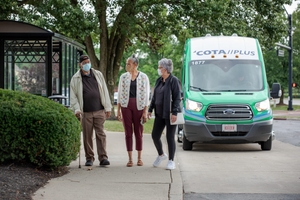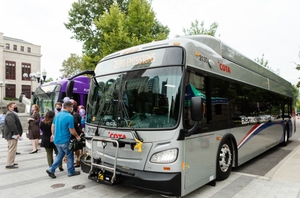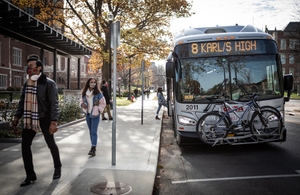COTA Plus On-Demand Transit Pilot to Serve Northeast Franklin County During COVID-19 Pandemic
COLUMBUS, Ohio — The Central Ohio Transit Authority (COTA) will launch a COTA//Plus microtransit service Tuesday, May 26, to complement existing transit options during the COVID-19 pandemic. The new COTA//Plus option is an on-demand pilot project to better serve northeast Franklin County customers impacted by COVID-19 service changes. The service is available from 7 a.m. to 8 p.m., seven days a week and will require no fare in accordance with COTA’s current emergency operations. This is the second COTA//Plus pilot launched by COTA in the past year.

This three-month pilot will provide transit access for customers who are experiencing lost fixed-route service in parts of Northeast Columbus, Westerville, Gahanna and New Albany. The area includes job centers such as Mount Carmel East Hospital and Easton. In April, COTA temporarily suspended Lines 25 (Brice), 35 (Dublin-Granville) and 45 (New Albany) to ease demands on operators during the pandemic.
Customers within the defined zone can use the COTA//Plus app to hail a COTA-branded vehicle to arrive at their nearest transit stop. Customers are transported to a transit stop within that defined zone, or to a transit stop that serves another bus line. The on-demand pilot can connect customers to seven active transit lines, including Line 10 and CMAX, which provide access to downtown Columbus.
“As the economy reopens, we are analyzing data from customers and businesses to reinvent how we serve the community and respond to areas in need of mobility,” said COTA President/CEO Joanna M. Pinkerton. “COTA Plus has already proven that microtransit can connect people to jobs, food and health care in Grove City. By using our available resources, we can continue to serve our northeast Franklin County customers and grow our ridership in a safe and efficient way.”
COTA//Plus launched its initial microtransit project in Grove City in July 2019 and will expand to Westerville in August of this year. Customers who do not wish to use the COTA//Plus App, can call COTA Customer Care at 614-228-1776 for scheduling assistance. The service must be used within the defined zone.
Since early March, COTA has taken multiple steps to combat the spread of the coronavirus:
- May 7 – COTA applied an innovative sanitization solution called Aegis Microbe Shield to every surface that could be touched by customers and operators, including metal, cloth, glass and plastic.
- April 27 – COTA launched an Essential Service Change to ease the demand on frontline employees and provide essential travel for customers.
- April 16 – COTA began doubling the cleaning and disinfecting of 118 transit shelters
- April 15 – COTA began requiring passengers to wear secure personal protection masks covering their faces.
- April 8 – COTA began distributing masks to all COTA employees.
- April 3 – COTA announced its Essential Travel Only Policy, for which buses are to be used by customers only for access to food, health care, travel to and from work, and caring for others.
- April 1 – COTA began mandatory temperature checks for all employees entering COTA facilities.
- March 19 – COTA suspended fares and instructed riders to board buses from the rear doors to keep separated from drivers.
- March 16 – COTA’s initial focused service changes reduced the number of bus routes and consolidated service in some areas.
- March 1 – COTA implemented the Stop the Spread Campaign, which provided tips on how to prevent the spread of infectious disease.
- COTA limits the number of riders on each bus to 20 and continues to ask riders to observe social distancing.
- All buses are sanitized multiple times daily, and COTA also cleans those buses every 12 hours with sanitizing solutions the Centers for Disease Control and Prevention have approved.
- All COTA vehicles are equipped with hand sanitizing dispensers, stocked daily and located at the front of the vehicle.
COTA continues evaluating all aspects of its service and operations to keep employees safe, and is working with the Transport Workers Union of America to ensure COTA’s operators have all they need to continue their work safely and effectively.



